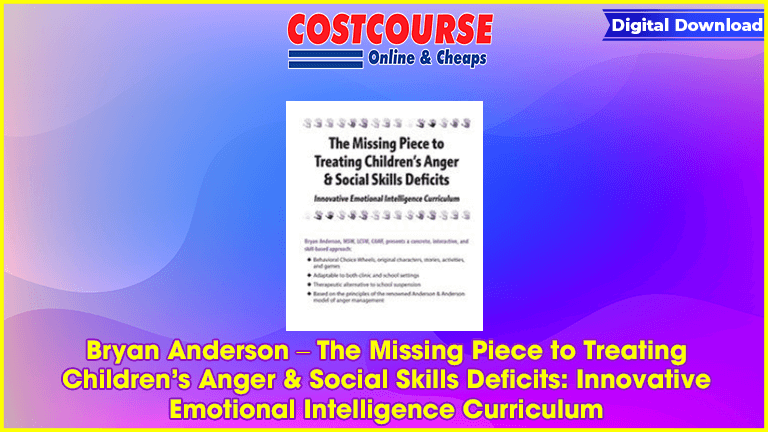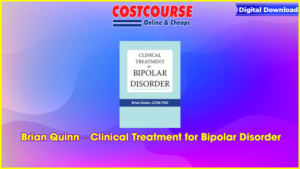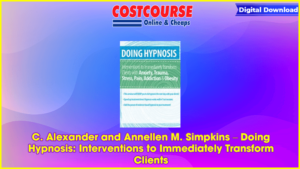Description
Emotionally Intelligent Children: Less Anger AND Improved Social Skills
The most misunderstood and poorly executed intervention is anger management.
Bryan Anderson – The Missing Piece to Treating Children’s Anger & Social Skills Deficits: Innovative Emotional Intelligence Curriculum
The most sought after, and most varied intervention for children is social skills. But why is this the case? Why aren’t these topics more frequently intertwined? And why do we wait so long to provide children support in this area?
Learn how to effectively use an emotional intelligence curriculum, designed by your instructor, to effectively address both anger and social skills deficits. You will discover the benefits of this curriculum for children as young as 4 years old, and how it helps them manage their anger, cope with disappointments and frustrations, and even learn how to be good friends. Case studies and group roleplays will give you a much deeper understanding and appreciation for how to use stories, illustrations, and re-enforcers to teach the Good Choice Wheel, a visual tool that embodies 4 coping strategies that every child needs.
Handouts
Manual – The Missing Piece to Treating Children’s Anger (1.11 MB) 53 Pages Available after Purchase
Outline
THEORETICAL BACKGROND AND BASICS OF MODEL
A positive approach: “You don’t have to be sick to get betterâ€
Why early intervention?
Behavioral therapy and social skills
THE ROOTS OF ANDERSON & ANDERSON IN ANGER MANAGEMENT INTERVENTION AND EMOTIONAL INTELLIGENCE COACHING
Modeling good behavior: “To teach kids, we must be able to teach ourselvesâ€
Defining Emotional Intelligence (EQ)
Our approach: history and current uses
Psychotherapy-Domestic Violence-Anger Management-EQ
Problems with other approaches
EQi model and coaching
Including adults—parents AND teachers
Contrasting Wheels of Behavior and the EQ assessment and Post-Test debrief
Reinventing the wheels into child-friendly and visual lessons
Activity: Which areas of emotional intelligence do you think are most vital for clinicians and teachers?
ANGER (AND OTHER CHALLENGING BEHAVIORS) IN CHILDREN
Focus must be on both anger and social skills
Lack of coping skills for anxiety or frustration
How anger develops in children – a developmental review
How parents reinforce bad behavior, and how teachers can make it worse
MOST COMMON CHILDHOOD CHALLENGES THAT CAUSE ANGER AND SOCIAL PROBLEMS
Frustration tolerance
Sensory overload
Trouble sharing
Inability to communicate
Inability to identify and express emotions
Not listening
Hurt feelings
Rigidity
Diagram of good choices and wheel intersecting with these challenges
GRAB THE WHEELâ„¢ CURRICULUM
Child-friendly language and visual learning
The Good Choice Wheel: 4 coping strategies every child needs
Strong words
Listening
Say how I feel
Try something different
Teach the wheel using social stories, illustrations
Emotion ID
Empathy
Tools to encourage use of more positive skills
Re-enforcers
Illustrations
Others
Goals
CASE STUDIES AND GROUP ROLEPLAYS
Faculty
Bryan Anderson, MSW, LCSW, CAMF
Bryan Anderson, MSW, LCSW, CAMF, is a behavioral therapist and clinical social worker who provides treatment for children, adolescents and adults diagnosed with autism, anxiety, OCD, depression, anger issues and more. His practice specializes in working with autism, anxiety, OCD, depression, anger issues and more. His practice specializes in working with behavioral, cognitive, academic, social and occupational functioning with his clients. Bryan teaches weekly social skills groups and is well known for applying strategies to reduce anxious, angry, and aggressive behaviors. He is the author of Grab the Wheel: Helping Young Children Manage Explosive Angerâ„¢, an interactive anger management and social skills curriculum for all children, including children with Autism Spectrum Disorders (ASD), in school or clinic settings. The curriculum is co-authored by leading UCLA researchers Dr. Stephanny Freeman and Dr. Tanya Paparella. Bryan co-authored a study on Comorbid Psychiatric Disorders in Preschoolers with Autism that was published in Behavior Disorders in 2010. A certified facilitator trained in the UCLA PEERS Social Skills model, he also is adept at providing social skills to children and teens on the Autism Spectrum.
Bryan trained and worked at the University of California, Los Angeles in the Early Childhood Partial Hospitalization Program (ECPHP), an internationally renowned clinic that treats young children with Autism Spectrum Disorder. He received his Masters from Columbia University School of Social Work where he trained as a therapist for children and adolescents at the Child & Family Institute of St. Luke’s Roosevelt Hospital Center. While at the St. Luke’s Child & Family Institute, Bryan created and led an anger management skills group for children 8-10 with mixed diagnoses, using his own curriculum as the primary model.
Speaker Disclosures:
Financial: Bryan Anderson is the owner of Grab the Wheel Kids; and Vice President of Anderson & Anderson. He receives a speaking honorarium from PESI, Inc.
Non-financial: Bryan Anderson has no relevant non-financial relationship to disclose.








